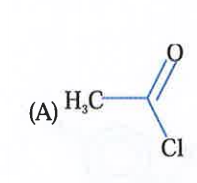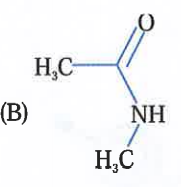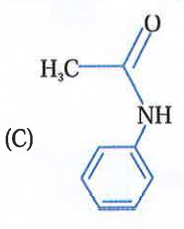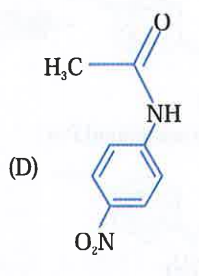Which of the following is the least reactive compound towards nucleophilic acyl substitution?
A
CH3COCl
B
CH3CONHCH3
C
CH3CONHC6H5
D

Text Solution
The correct Answer is:B
More basic the leaving group, less reactive is the acyl derivative. Now basicity of the leaving groups decreases in the order : CH3NH−>C6H5NH−>p−NO2−C6H4−NH−>Cl− , therefore, CH3CONHCH3 is the least reactive acyl derivative.
|
Topper's Solved these Questions
- ALDEHYDES, KETONES AND CARBOXYLIC ACIDS BOOK - MTG GUIDECHAPTER - ALDEHYDES, KETONES AND CARBOXYLIC ACIDS EXERCISE - NEET CAFE (USES OF ALDEHYDES, KETONES AND CARBOXYLIC ACIDS)
4 Videos
- ALDEHYDES, KETONES AND CARBOXYLIC ACIDS BOOK - MTG GUIDECHAPTER - ALDEHYDES, KETONES AND CARBOXYLIC ACIDS EXERCISE - CHECK YOUR NEET VITALS
21 Videos
- ALDEHYDES, KETONES AND CARBOXYLIC ACIDS BOOK - MTG GUIDECHAPTER - ALDEHYDES, KETONES AND CARBOXYLIC ACIDS EXERCISE - NEET CAFE (PROPERTIES OF ALDEHYDES AND KETONES )
112 Videos
- ALCOHOLS, PHENOLS AND ETHERSBOOK - MTG GUIDECHAPTER - ALCOHOLS, PHENOLS AND ETHERSEXERCISE - AIPMT/NEET
21 Videos
- BIOMOLECULESBOOK - MTG GUIDECHAPTER - BIOMOLECULESEXERCISE - AIPMT/NEET (MCQS)
19 Videos
Similar Questions
Knowledge Check
Which one of the following is least reactive compound for nulceophilic acyl aubstitution.
A B
B C
C D
D
Which of the following is the least reactive towards nucleophile?
ACH3CH2ClBCH3ClCH2C=CH−CH2ClDC6H5ClWhich of the following is the least reactive towards nucleophile?
ACH3CH2CH(CH3)CH2NH2 ↓NH3CH3CH2CH(CH3)CH2BrBCH3CHOHCN−−→CH3CH(OH)CNCCH3CH=CH2H2O/H+−−−−−→CH3CH(OH)CH3DRCHO+R'MgX→RCH(OH)R'
Which of the following will be least reactive towards nucleophilic substitution reaction ?
View SolutionWhich of the following will be least reactive towards nucleophilic substitution reaction ?

View SolutionWhich of the following are most reactive compounds for nucleophilic acyl substitution?
View SolutionWhich of the following is least reactive towards nucleophilic substitution?
View SolutionWhich of the following is the most reactive towards nucleophilic substitution reaction ?
View Solution
